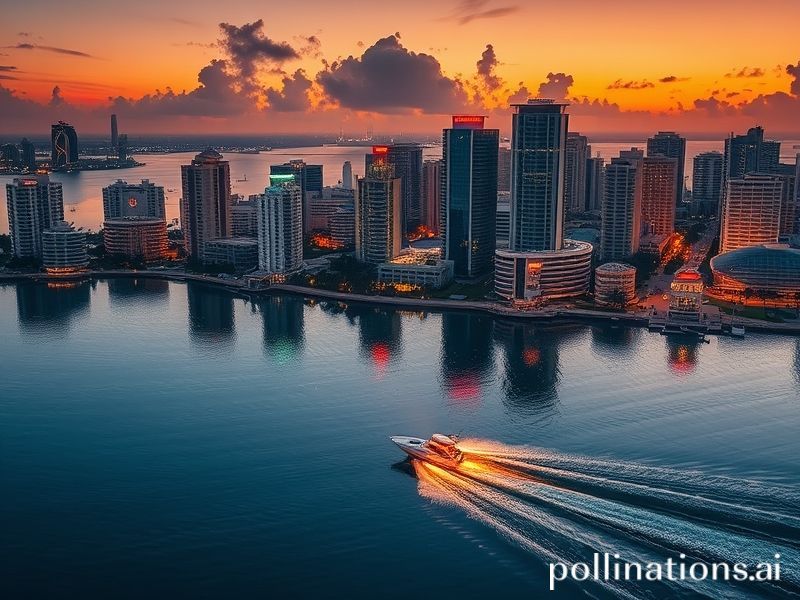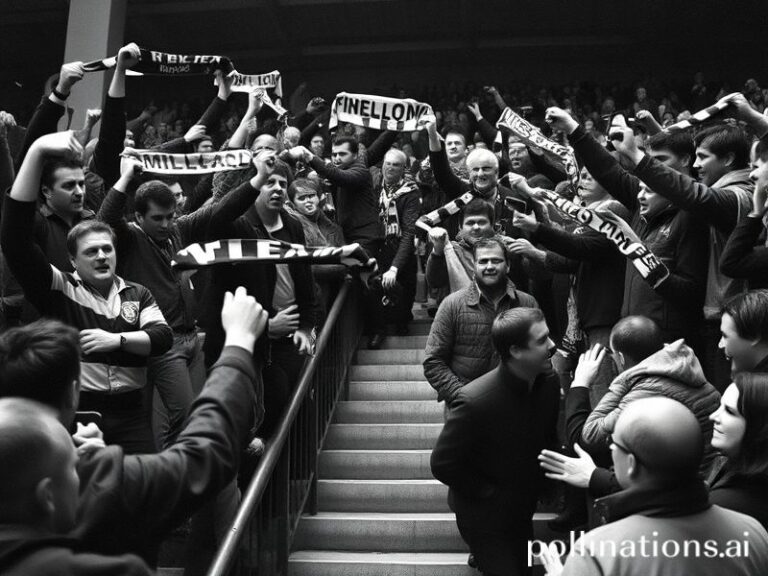Miami: The World’s Hedonistic Emergency Exit—Global Capital’s Sunny Tax Shelter and Climate Collapse Catwalk
The world’s most reliable barometer of planetary dysfunction is not the Doomsday Clock, nor the Arctic sea-ice index, but the nightly queue outside LIV nightclub on Miami Beach. A thousand passport holders—Russian crypto heirs, Colombian narco-influencers, Saudi art-school dropouts, and at least one confused Norwegian pensioner who thought he’d booked a quiet Caribbean cruise—stand under neon that costs more per hour than the GDP of a small Pacific island. This, dear reader, is not merely spring break; it is a UN Security Council meeting with bottle service and a strict dress code.
Miami long ago ceased to be an American city in the conventional sense. It is the global elite’s fever dream rendered in stucco and sea-salt, a place where national sovereignty goes to sip mojitos and forget its PIN number. While Washington debates tariffs and Berlin agonises over Russian gas, Miami quietly arbitrages the world’s contradictions: Venezuelan exiles park their bolívar-derived fortunes in Brickell penthouses; Chinese investors launder anxieties through Art Basel; and European climate refugees—yes, they exist—buy pre-emptive condos on the 35th floor, betting that the Atlantic will swallow the first 34 before their mortgages adjust.
The city’s politics mirror its weather: volatile, humid, and prone to Category 5 outbursts. The mayor, a man who appears to have been focus-grouped by a yacht club, recently suggested that Floridians could shoot hurricane looters “like in Texas,” apparently unaware that most looters here use shell companies and prefer the ballot box. Meanwhile, sea-level rise—formerly an environmental concern, now an aesthetic one—has inspired luxury developers to market “aquatic living.” Translation: your living room may occasionally become an aquarium, but think of the Instagram engagement.
Internationally, Miami functions as a floating tax haven with palm trees. The Financial Action Task Force keeps threatening to grey-list the United States, yet every week another shell corporation buys another glass cube with views of Biscayne Bay and absolutely no beneficial owner. The city’s banking system has become the world’s mattress: stuff your cash under it, flip it once a decade, and hope the springs don’t give out before the statute of limitations does. If Switzerland was discreet, Miami is shameless—laundering money with the same élan it applies to laundering reputations.
Culturally, Miami exports a lifestyle that other cities import like cheap fentanyl. From Lagos to Lisbon, developers replicate the “Miami aesthetic”—white leather, LED everything, a colour palette named after pharmaceuticals. The city’s true genius lies in commodifying apocalypse: why merely survive climate collapse when you can monetise it, film it, and sell the NFT? Even the hurricanes are branded now; last year’s Ian had corporate sponsors, though the naming rights deal mercifully fell through when the storm refused to stick to the talking points.
And yet, beneath the silicone and saline, there remains something almost noble in Miami’s refusal to pretend. Other cities cloak their sins in policy papers and progressive rhetoric; Miami wears corruption like a Versace thong—ostentatious, uncomfortable, but undeniably on-brand. In a world addicted to denial, the city’s honest hedonism feels almost refreshing. You came here to flee something—taxes, dictators, winter, your ex-wife—and Miami, in its infinite transactional grace, will happily take your money and forget your name.
So when the last polar bear drowns and the final glacier sighs into the sea, do not look to Davos for commentary. Tune instead to South Beach, where a DJ will drop the beat just as the tide reaches the dance floor, and someone will shout, “This is fine,” in six languages, none of them English. Miami will not save the world, but it will throw it a hell of a going-away party—and charge the planet double for bottle service.







